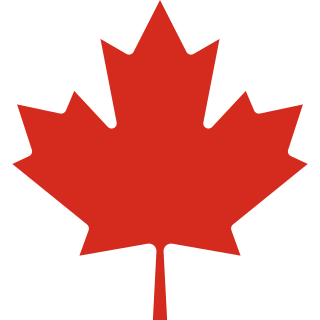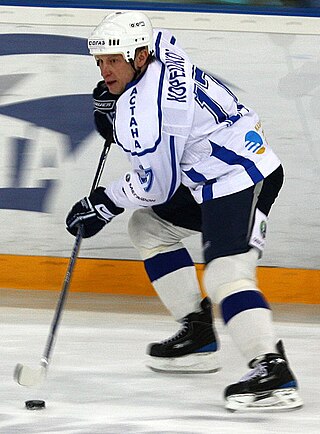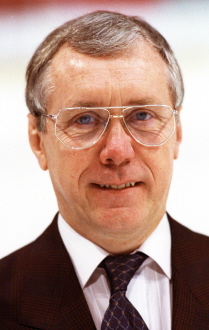
The Ice Hockey World Championships are an annual international men's ice hockey tournament organized by the International Ice Hockey Federation (IIHF). First officially held at the 1920 Summer Olympics. The IIHF was created in 1908 while the European Championships, the precursor to the World Championships, were first held in 1910. The tournament held at the 1920 Summer Olympics is recognized as the first Ice Hockey World Championship. From 1920 to 1968, the Olympic hockey tournament was also considered the World Championship for that year.

The Canada men's national ice hockey team is the ice hockey team representing Canada internationally. The team is overseen by Hockey Canada, a member of the International Ice Hockey Federation. From 1920 until 1963, Canada's international representation was by senior amateur club teams. Canada's national men's team was founded in 1963 by Father David Bauer as a part of the Canadian Amateur Hockey Association, playing out of the University of British Columbia. The nickname "Team Canada" was first used for the 1972 Summit Series and has been frequently used to refer to both the Canadian national men's and women's teams ever since.
Sportin Latvia includes basketball, football, ice hockey, athletics (track), rugby, tennis, cycling, and others. Ice hockey is the most popular of the Latvian sports and is closely followed by basketball. Some of Latvia's most notable athletes include hockey player Sandis Ozoliņš, football player Māris Verpakovskis, Olympic javelin thrower Jānis Lūsis, two-time Olympic BMX champion Maris Strombergs, and basketball player Kristaps Porziņģis. The national sport of Latvia is ice hockey.

The United States men's national ice hockey team is based in Colorado Springs, Colorado, with its U18 and U17 development program in Plymouth, Michigan. The team is controlled by USA Hockey, the governing body for organized ice hockey in the United States. The U.S. team is currently ranked 6th in the IIHF World Rankings.

The Russian men's national ice hockey team is the national men's ice hockey team of Russia, overseen by the Ice Hockey Federation of Russia. As of 2021, they were rated third in the IIHF World Ranking. The team has competed internationally from 1992 until it was provisionally suspended in 2022, and is recognized by the IIHF as the successor to the Soviet Union team and CIS team. Russia has been one of the most successful national ice hockey teams in the world and a member of the so-called "Big Six," the unofficial group of the six strongest men's ice hockey nations, along with Canada, the Czech Republic, Finland, Sweden, and the United States. The European nations of the Big Six participate in the Euro Hockey Tour, which Russia won nine times since 2005. Since September 2021, the head coach is Alexei Zhamnov, who took over from Valeri Bragin.
The men's ice hockey tournament at the 1960 Winter Olympics in Squaw Valley, United States, was the ninth Olympic Championship, also serving as the 27th World Championships and the 38th European Championships. The United States won its first Olympic gold medal and second World Championship. Canada, represented for the second time by the Kitchener-Waterloo Dutchmen, won the silver and Canada's ninth consecutive Olympic ice hockey medal. The Soviet Union won the bronze medal and its sixth European Championship. The tournament was held at the Blyth Arena, under the supervision of George Dudley on behalf of the International Ice Hockey Federation.

The Soviet national ice hockey team was the national men's ice hockey team of the Soviet Union. From 1954, the team won at least one medal each year at either the Ice Hockey World Championships or the Olympic hockey tournament.

Ice hockey tournaments have been staged at the Olympic Games since 1920. The men's tournament was introduced at the 1920 Summer Olympics and was transferred permanently to the Winter Olympic Games program in 1924, in France. The women's tournament was first held at the 1998 Winter Olympics.

The Triple Gold Club is the group of ice hockey players and coaches who have won an Olympic Games gold medal, a World Championship gold medal, and the Stanley Cup, the championship trophy of the National Hockey League (NHL). The International Ice Hockey Federation (IIHF) considers them to be "the three most important championships available to the sport".

Kazakhstan's former long-term President, Nursultan Nazarbayev, has challenged sports organizers to engage 30 percent of the country's population in sports. The state has numerous sports clubs where people participate in various types of sports; sport facilities are available to the general public. Kazakhstan currently hosts major international tournaments; Astana and Almaty hosted the VII Asian Winter Games 2011, which drew teams from 27 countries.
The IIHF World Junior Championship (WJC), sometimes referred to as World Juniors, is an annual event organized by the International Ice Hockey Federation (IIHF) for national under-20 ice hockey teams from around the world. It is traditionally held in late December, ending in early January. The tournament usually attracts the top hockey players in this age category.
A wide array of sports are played in Armenia. Popular sports in Armenia include football, basketball, volleyball, and ice hockey. Further, the country sends athletes to the Olympics in boxing, wrestling, weightlifting, judo, gymnastics, track and field, diving, swimming, and shooting. Armenia's mountainous terrain provides great opportunities for the practice of sports like skiing and rock climbing. Being a landlocked country, water sports can only be practiced on lakes, notably Lake Sevan. Competitively, Armenia has been very successful at chess, weightlifting, and wrestling at the international level. Armenia is also an active member of the international sports community, with full membership in the Union of European Football Associations (UEFA), Federation of International Bandy (FIB), International School Sport Federation, International Ice Hockey Federation (IIHF), among others. It also hosts the Pan-Armenian Games.

The Canadian men's national under-20 ice hockey team is the ice hockey team representing Canada internationally in under-20 competition. Their primary participation in this age group comes at the International Ice Hockey Federation's World Junior Championship, held annually every December and January. The team also participates in various exhibition matches and occasional exhibition series, such as the 2007 Super Series against their Russian counterparts, an eight-game exhibition series commemorating the 35th anniversary of the 1972 Summit Series.
Sport plays an important role in Estonian culture. Estonia first competed as a nation at the 1920 Summer Olympics, although the National Olympic Committee was established in 1923. Estonian athletes took part at every Olympic Games until the country was annexed by the Soviet Union in 1940. The 1980 Summer Olympics sailing regatta was held in the capital city Tallinn. Estonia has won most of its Olympic medals in wrestling, athletics, weightlifting, and cross-country skiing.

The Russian men's national under 20 ice hockey team is the national under-20 ice hockey team in Russia. The team represented Russia at the International Ice Hockey Federation's World Junior Hockey Championship, held annually every December and January. After the Russian invasion of Ukraine, the International Ice Hockey Federation suspended Russia from all levels of competition.

The Soviet Union men's national under 20 ice hockey team was the national under-20 ice hockey team in the Soviet Union. The team represented the Soviet Union at the International Ice Hockey Federation's IIHF World U20 Championship. The team has won eleven gold medals, three silver medals, and two bronze medals at the World U20 Championships.
The Czechoslovakia men's national under-18 ice hockey team was the men's under-18 ice hockey team that represented Czechoslovakia at international competitions. It was succeeded by the Czech Republic men's national under-18 ice hockey team in 1993.

Bo Tovland was a Swedish ice hockey coach and executive. He was the general manager of the Sweden men's national ice hockey team at seven Ice Hockey World Championships, three Winter Olympics and three Canada Cup tournaments. Under his leadership, Sweden won gold in ice hockey at the 1994 Winter Olympics, and three gold medals at the Ice Hockey World Championships. He previously coached the national junior team to a gold medal at the 1981 World Junior Ice Hockey Championships, and won multiple medals coaching the under-18 men's team. He began working for the Swedish Ice Hockey Association in 1961, sat on its board of directors from 1981 to 2002, and was its vice-chairman for eight years. He was also a member of the Swedish Olympic Committee from 1985 to 2005, and was a member of International Ice Hockey Federation committees from 1998 to 2008. Tovland received multiple honors for his career in hockey, which included H. M. The King's Medal in 1996, the Paul Loicq Award for contributions to international ice hockey in 2006, and induction into the Swedish Hockey Hall of Fame in 2012.












